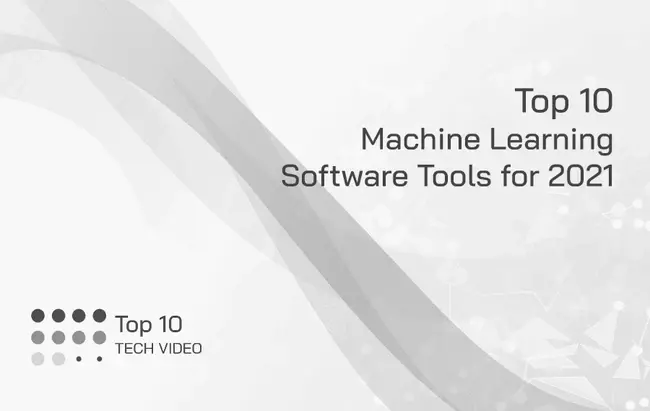
The global market size for machine learning is expected to reach a value of $117.19 billion (£85.96B) by 2027. For years, the industry has been growing and evolving, unlocking opportunities for companies of virtually any size, in any industry.
Now, as the world moves through a massive digital transformation, the demand for intelligent machinery is than ever. Fortunately for leaders keen to leverage this environment, there are various fantastic software applications and tools available to create your own learning solution.
Today, we’re going to explore some of the best machine learning software tools available in 2021 and what makes them so impressive.
Google Cloud AutoML
Perhaps one of the most accessible machine learning software options around, Google’s Cloud AutoML solution enables even developers with limited experience in the AI landscape to train high-quality models for machine learning. This immersive technology promises any company an opportunity to unlock the full benefits of artificial intelligence through pre-trained models designed to support various services, like speech and text recognition.
AutoML from Google is extremely popular among a lot of companies who are just starting to experiment with the possibilities of artificial intelligence. Those interested in training custom machine learning models through the convenient software can even try the service for free.
Liked this video? Subscribe to our YouTube channel for the latest news in enterprise technology.
Amazon Machine Learning
Amazon Machine learning software, or “AWS Machine Learning,” aims to put machine learning opportunities into the hands of every developer and data scientist. The platform, named a leader in the AI developer services Magic Quadrant by Gartner, is helping companies of all sizes to rediscover what’s possible in the ML landscape.
With this technology, companies can build, train and deploy various ML services quickly, add AI into existing applications, or build specific solutions based on the unique needs of their industry. There’s tons of support for getting started and plenty of deep learning frameworks and ML infrastructure options to choose from.
TensorFlow
Now owned by Google, TensorFlow is a well-known name in the machine learning landscape. Like many of the most popular software options on the market, TensorFlow has an open-source framework that’s excellent for large-scale machine learning projects. It blends both neural network models with other machine learning strategies, and it’s excellent for people who already work with Python.
Perhaps the most important feature of TensorFlow is that it can run on both CPU and GPU technology. There’s also plenty of models and datasets to discover, with support for things like natural language processing, image classification, and more. TensorFlow also recently created its own certification program.
KNIME
Promising to make innovation more accessible to the masses, KNIME specialises in everything from data analysis and management to deep learning development. Through KNIME software, businesses can access data from various touchpoints throughout the organisation and merge information into actionable insights. You can make sense of your trends using data tools you choose, then use the information you choose to inform your machine learning models.
KNIME is a fully open-source machine learning tool based on GUI. There’s no need for any in-depth programming knowledge to begin using this service. Anyone can start jumping in and making the most of their mined data.
RapidMiner
RapidMiner is a machine learning platform designed for business leaders, data scientists, and forward-thinking organisations. Already popular among more than 40,000 companies worldwide, RapidMiner helps organisations to tap into their valuable data and use it to create machine learning solutions. The company recently earned the position of “Leader” in the Forrester Wave report for 2020 Predictive Analytics and Machine Learning.
RapidMiner customers can access a variety of machine learning models using visual workflow designers, automated modelling tools, and expansive tools for data discovery and prep. There are applications for virtually every industry too!
Azure Machine Learning Studio
Created by Microsoft, Azure Machine Learning studio was one of the world’s first drag-and-drop software solutions for machine learning technology. Today, there’s a much broader set of machine learning tools available from the Azure portfolio, including the Machine Learning Designer, which simplifies and accelerates the process of building, testing, and managing machine learning models.
Azure Machine Learning Studio is an easy-to-access service that helps companies to connect modules and datasets into a strategy for building ML technology. Azure also provides support for GPU and CPU access.
Jupyter Notebook
Jupyter Notebook is perhaps one of the best-known machine learning software tools of all. The solution combines lightning-fast processing speeds with an intuitive and efficient platform for building and learning. What’s more, developers have their choice of three different languages to work with: Python, R, and Julia.
As an open-source solution for machine learning and computing applications, Jupyter supports a vast community of developers from all over the world. The Jupyter notebook ensures that you can share and store live code as you work on your projects, then access technology through a GUI.
Shogun
Otherwise known as Shogun toolbox, Shogun is an open-source and free-to-use software library for machine learning. The solution is entirely in C++, and it’s very accessible for businesses of all backgrounds and sizes. You can even access Shogun in various other development languages, including R, Python, Ruby, Scala, and more.
Shogun comes with numerous algorithms and data structures to explore for common machine learning problems. You can use this software to build support for vector machines into an existing tool or experiment with clustering algorithms and linear discriminant analysis. Innovative user interfaces make it easier to learn and evolve.
Scikit-Learn
An interesting approach to machine learning software, Scikit-Learn is a machine learning package built as a unified platform. You can access this technology for a variety of data management and building strategies. Customers of Scikit-Learn appreciate its data regression, classification, clustering, and pre-processing capabilities, as well as the ability to access other Python libraries.
Aside from giving you various ways to manage and transform your data, this technology can also help business leaders in building Python-based machine learning systems. You can even test and train your models in the same environment.
WEKA
Better known to some as the Waikato Environment for Knowledge Analysis, WEKA was designed at the University of Waikato, in New Zealand. This tried-and-tested solution for open-source machine learning is available to access through a GUI, Java API, or standard terminal applications. While WEKA has many use case potentials, it’s commonly used for research, teaching I models, and creating powerful applications.
WEKA is great for beginners because it comes with a wide selection of built-in tools included for creating machine learning tasks. You can also get full and transparent access to various other well-known toolboxes, like Sckit-Learn.












